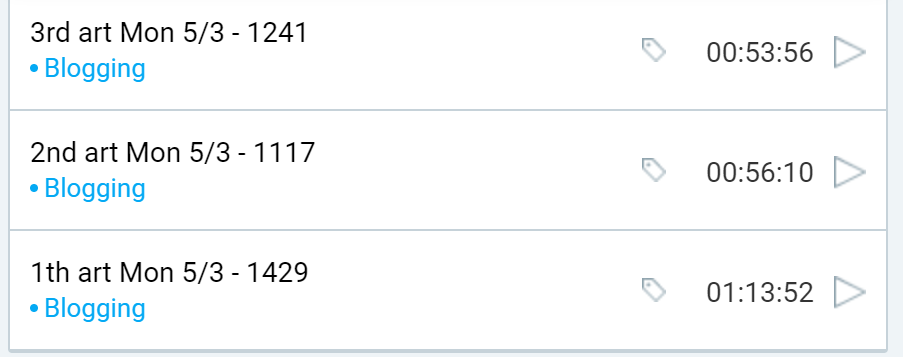What's the Average Words Per Minute
Your Word-per-Minute Typing Speed Doesn't Matter That Much
How I write faster without trying to improve my typing speed
![]()

Before starting to write online, I was both optimistic and pessimistic. Depending on the day, I would either think I could write a thousand-word article in 20 minutes or it'd take me two hours.
It turns out neither was too much off. I've had days when I crushed article after article. I've had days when one single article felt more difficult to write than climbing the Himalayas.
My typing speed was never what slowed me down.
I practiced typing when I was a teenager but the keyboard was the French one (Azerty). I never learned the common Qwerty keyboard. I just practiced it by using it for work or some classes and it became second nature. I knew I could type faster than many people but I wasn't far from the average of 45 Words Per Minute (WpM).
My average typing speed was 50–60 WpM. Since I began writing online, it's gone up to near 80. In theory, that's 4,800 words per hour. In reality, I've never even reached half that amount.
What matters isn't how fast you type, it's what you learn through practice. And practice starts with two realizations.
Nobody's got a stopwatch
There's no boogieman looking over your shoulder all the time and pushing you to type a certain amount of words in a short amount of time. No pressure from other people.
Nobody cares whether it took you 20 minutes to write an article or 3 hours. What the readers want is a good story. If you wrote the exact same story in 4 days and in an hour, nobody would know. Only you.
You're the only one who cares how fast you type.
Would it help to be able to type faster? Maybe. But thinking this is what is slowing you down is wrong at best. At worst, it's hurting your productivity. Your words matter. Not the time it took you to type them.
You'll start slow
When I started my 1-year writing challenge, I sometimes struggled to type 300 words in an hour. That's 5 words per minute. Now, over two years later, I eat those 300 words for breakfast. I recently wrote a 2,000-word article in 1 hour and 22 minutes. That's 22 words per minute. Over 4 times as fast.

I began typing faster but that's not the only difference. I also learned to string my ideas with more ease. I learned to not get stuck on one paragraph for 20 minutes. I learned to be more creative.
I'm not bragging. I'm sure some writers type 3 to 4 times as fast as I do. But I know I'll get better as I keep writing article after article. With over 800 articles behind me and thousands ahead, the road to stringing ideas better and typing faster will never reach an end.
Typing quickly doesn't matter that much. You have to think and manufacture sentences you're proud of. That's why you'll never type at your full theoretical speed for an hour straight. If you do, however, tell me how. I'd love to know the trick.
Practice & flow
Until you tell me your trick, I'll keep using what seems to work best for most writers: practice a whole lot. After 800 articles, I can say with confidence my writing style has improved. I also know I've only spent 2 years and a half writing. That's nothing. In a decade, I'd probably laugh at my current writing style.
Practice makes perfect, they say. I disagree. "Practice makes confidence," would seem better to me.
The more you write, the more confidence you gain in your capacities. The more you write, the more you realize people don't care for perfection. The more you write, the more you can transform simple stories into adventures transporting the readers.
And the more you write, the more you live in "flow". Flow, as described by Mihaly Csikszentmihaly is an optimal experience during which we lose all perception of time and effort. Despite putting some real efforts.
Tim Denning wrote an amazing piece about the power of flow so I won't dive into it now. In a nutshell, flow allows you to make connections your brain wouldn't have made otherwise. It allows you to be more creative.
What matters isn't your WpM. It's whether your ideas are flowing.
Stop writing one-offs
New writers tend to give themselves a short amount of time here and there to write. I did too. After all, it's important to develop the habit of writing first. If you don't write often enough, all you need is a pebble to make you trip and fall of the wagon.
After you've understood the power words can hold, you should be safe. There's no turning back from writing once you've experienced how it can improve your life.
That's when batching articles could become a good tool to reach flow. The more articles you create in a row, the easier the words flow out of your mind onto the keyboard.
Remember that 2,000-word article I wrote? It wasn't out of nowhere. It was my 4th article of the day. I had already written over 3,500 words when I started it. Each word I wrote was a part of what got me in flow.

I stopped caring for how quickly I typed. I stopped caring about how far I was in the story. I stopped caring for how much time I had left in my session. That's why, despite often being shorter, my last articles are usually my favorite ones. I'm completely lost in the task by then.
I tried so hard to understand what flow was. I even read Mihaly Csikszentmihalyi's book about it. But in the end, it doesn't even matter. There's no checklist to follow to reach a flow state. Each such experience is different from the previous one.
But if there's one thing that's made flow states more frequent for me, it batching my articles. Try it. It could help you too.
Final thoughts
Your WpM doesn't matter. Sure, if you typed faster, you could probably write more. In theory. In reality, what matters isn't how fast you type. It's how you string your ideas.
Enough practice should get you there but don't be afraid to experiment. Try new types of articles. Write more articles in a row. Discover flow. Improve your quality as well as quantity.
Your WpM doesn't matter.
Ideas flowing do.
What's the Average Words Per Minute
Source: https://writingcooperative.com/your-word-per-minute-typing-speed-doesnt-matter-that-much-e66985a33a2f